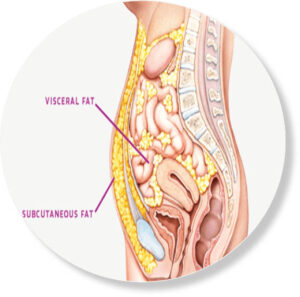 What is it that’s causing widespread obesity and weight gain in the modern world? The issue is becoming increasingly severe, with almost 50% of Indians classified as overweight or obese in urban areas and 38% in rural areas. While various factors such as unhealthy fats, excessive processed food and sugar intake, and pollution have been blamed for this problem, the answer is likely a combination of these and other factors. As a result, millions worldwide struggle with weight loss throughout their lives.
What is it that’s causing widespread obesity and weight gain in the modern world? The issue is becoming increasingly severe, with almost 50% of Indians classified as overweight or obese in urban areas and 38% in rural areas. While various factors such as unhealthy fats, excessive processed food and sugar intake, and pollution have been blamed for this problem, the answer is likely a combination of these and other factors. As a result, millions worldwide struggle with weight loss throughout their lives.
The growing popularity of fad diets serves as evidence of this weight-loss challenge. Weight loss involves more than the straightforward ‘calories in, calories out’ approach. Limiting food consumption may not always be the solution. Sustainable weight loss is often difficult for most individuals, as the process is far from being a straightforward formula. This is because the human body is complicated, and every individual possesses unique characteristics. The ‘One diet fits all’ rule doesn’t apply here.
It has long been believed that gaining weight leads to health issues, but in my years of clinical practice, I have come to believe that weight gain and the inability to lose weight are symptoms of an unresolved health issue… meaning, your weight gain could be the result of a health issue – simply put a negative consequence! This helps us explore the solution of weight loss from a different perspective by prioritizing our health. Simply put, WE NEED TO BECOME HEALTHY TO LOSE WEIGHT, NOT LOSE WEIGHT TO BECOME HEALTHY! Increased health leads to a more balanced body, and at that point, weight loss may occur naturally or with minimal assistance.
What symptoms indicate hormonal abdominal fat?
The increasing waistline, pot belly, beer belly, or just belly fat, is one of the most common complaints I hear when it comes to weight loss that is difficult to maintain. For many people, this is the first body part where weight gain is visible and the area where it wants to stay the longest. Contrary to subcutaneous fat, which is kept right under the skin (the kind you can squeeze), belly fat is typically visceral and is kept all the way inside the abdominal cavity, around the midsection. Because it is below the muscle rather than on top, it feels harder.
Visceral fat significantly raises your risk for serious health issues because of its proximity to (and occasionally surrounding) your body’s key organs. Because visceral fat cells are directly released into your bloodstream, they wind up getting into your liver, pancreas, heart and other vital organs. This is problematic because these fat cells contain triglycerides, which can pump potentially harmful free fatty acids into cells that are not intended to store fat. Reduce this sort of fat as much as you can because it can set off a chain reaction of health issues.
How do you get rid of hormonal abdominal fat?
Restricting your food intake and eating less won’t help you lose weight, especially if it’s this kind of fat. Keep in mind – a balanced body results from improved health. Visceral fat and weight growth are indicators of an unbalanced system, which significantly impact how well your body burns fat, particularly hormonal belly fat. Hormonal imbalance is surely likely to contribute to this issue.
Two Indicators That Your Hormones Are Causing Weight Gain:
(I) Lack Of Satisfaction Following A Meal: A sign that your sex hormones (testosterone and oestrogen) are indirectly affecting your primary hormones that control your metabolism, is if a meal that used to satisfy you, now makes you feel hungry again.
Tips to work on this: Flax seeds, cruciferous vegetables (kale, cauliflower, broccoli, cabbage), and fermented foods should be on your menu if you have low oestrogen and a hormonal belly.
(II) You Constantly Feel Anxious/Stressed: Your adrenal glands release cortisol when you’re under stress, to assist your body react properly. When your body needs to react quickly, like in a fight or flight scenario, a sudden increase in cortisol can be advantageous. However, if you’re always stressed out, your adrenals may not be aware that they’re secreting far more cortisol than you’ll ever need, which is not healthy as it raises blood pressure, blood sugar and heart rate. Furthermore, studies have found a strong correlation between elevated cortisol levels and an increase in belly fat.
Tips to work on this: Stress and weight gain are linked. Your body shouldn’t have to deal with stress constantly. Many of my patients who go on a vacation return weighing much lesser due because they’re less stressed. And then the weight returns once they’re back in the daily grind. Even while you’re at home, you can find peace and manage life’s stresses better by establishing a daily meditation practice. According to research, daily meditation significantly lowers the blood’s cortisol levels, which eases stress and inflammation while promoting weight loss.
There’s so much more that needs to be shared on this topic! Stay tuned for the next article! And remember, you don’t have to deal with this alone. Get in touch with a professional to help you navigate through this in a systematic manner.
- Healing or Harmful? - 15 March2025
- The Parsi Woman’s Guide To Superfoods For Hormonal Health - 8 March2025
- Strengthen Your Constitution This Republic Day! - 25 January2025
